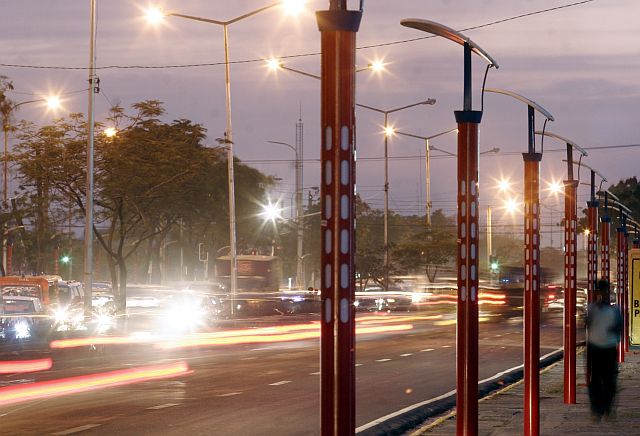
The cost of the contract for these decorative lampposts along the sidewalk of the North Reclamation Area, Mandaue City, was declared “bloated and excessive” in a Commission on Audit report. | CDN file photo
The Supreme Court acquitted three former officials of the Department of Public Works and Highways (DPWH) and a private contractor of graft charges in relation to the installation of allegedly overpriced lampposts during the 2007 Association of Southeast Asian Nations (Asean) summit held in Cebu.
In a 22-page decision promulgated on Oct. 11, 2023, but made public only on Friday, the high court’s Third Division found that the prosecution failed to establish all elements of violation of Section 3(e) of Republic Act No. 3019, or the Anti-Graft and Corrupt Practices Act.
In particular, the Supreme Court said there was “no clear showing of any corrupt intent on the part of any of the accused.”
The high tribunal granted the appeal of the accused, including former DPWH Central Visayas officials Robert Lala, Pureza Fernandez and Agustinito Hermoso, and private contractor Gerardo Surla, and overturned the 2020 decision of the Sandiganbayan.
ALSO READ: Sandiganbayan orders jail time for individuals convicted over ASEAN Summit lamp posts
Cebu lampposts
In preparation for the 2007 Asean summit, the DPWH was tasked to oversee the supply and installation of decorative lampposts and other street lighting facilities in Mandaue City and Lapu-Lapu City in Cebu — projects that were categorized under road safety.
Three bidders were selected for two contracts on the street lighting projects, with Gampik Construction and Development Inc. named as the lowest bidder for both.
However, court records showed that a memorandum of understanding (MOU) dated Nov. 22, 2006, was apparently executed between the DPWH Central Visayas and Gampik, where the latter was authorized to immediately proceed with the project even before the conduct of the public bidding on Nov. 28, 2006.
ALSO READ: Lamp post controversy: Sandiganbayan convicts ex-Lapu mayor, 12 others
In December 2006, Gampik received P21.23 million as payment for 85 percent of the work accomplished for the first contract worth P24.98 million. No payment was made for the second contract worth P35.63 million.
In January 2007, the Office of the Ombudsman in the Visayas received a letter from a people’s organization in Cebu requesting a probe of the Asean lamppost projects, alleging that the actual cost was much lower than the price paid by the government.
The following month, the Ombudsman received a letter from businessman Crisologo Saavedra who submitted a contract proposal showing that he supplied, delivered and installed decorative street lights in Cebu for P25,124.53 per set.
‘Highly overpriced’
The Ombudsman’s Public Assistance and Corruption Prevention Office subsequently collected evidence, launched a factfinding initiative and in its final evaluation report found that the lampposts and other lighting facilities were “highly overpriced.”
ALSO READ: DPWH asked to return P43M spent for costly Cebu street lights
The Ombudsman’s computation found that the first contract was excessive by P17.5 million while the Commission on Audit’s cost evaluation showed it was P16.2 million more expensive than imported lamps.
In a 2020 ruling, the Sandiganbayan found Lala, Fernandez and Hermoso guilty of graft as they “illegally and prematurely entered into the MOU with Gampik.” The charge came with a penalty of up to eight years imprisonment.
Meanwhile, Surla was found to be “in conspiracy” with the three DPWH officials.
The accused argued, among others, that the date in the MOU was a mere typographical error and that there was no prior determination of the winner before the public bidding. They added that there was no proof that the project started before the bidding on Nov. 28, 2006.
Their motions for reconsideration were junked by the antigraft court, prompting them to bring the case to the Supreme Court.
According to the Supreme Court, the right of the accused to be informed was not violated because the information adequately alleged the ultimate facts constituting the offense charged.
However, the high court found that the Sandiganbayan gravely erred in convicting the accused.
“Indeed, while their right to due process was properly observed, the prosecution failed to establish each and every element of the crime charged,” it said.

